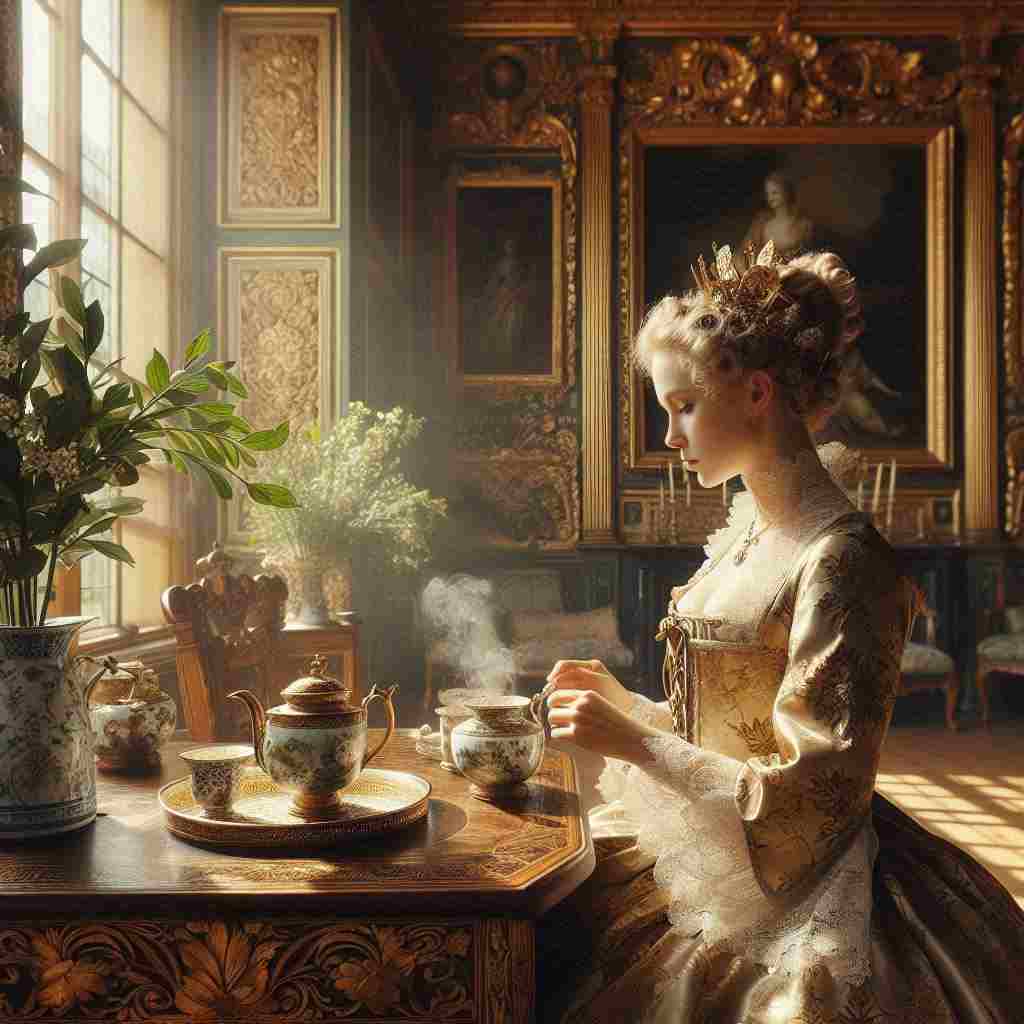On Tea
Edmund Waller
1606 to 1687

Venus her myrtle, Phoebus has her bays;
Tea both excels, which she vouchsafes to praise.
The best of Queens, and best of herbs, we owe
To that bold nation, which the way did show
To the fair region where the sun doth rise,
Whose rich productions we so justly prize.
The Muse's friend, tea does our fancy aid,
Repress those vapors which the head invade,
And keep the palace of the soul serene,
Fit on her birthday to salute the Queen.
Edmund Waller's On Tea
Introduction
Edmund Waller's "On Tea" stands as a pivotal work in the literary canon, not merely for its subject matter but for its historical significance as one of the earliest English poems to extol the virtues of tea. This concise yet richly layered poem, comprising a mere ten lines, encapsulates the cultural zeitgeist of 17th-century England, a period marked by expanding global trade and shifting social customs. Waller, a poet known for his political acumen as much as his literary prowess, deftly weaves classical allusions with contemporary praise, creating a work that is both timeless in its artistry and firmly rooted in its historical context.
Historical Context
To fully appreciate the nuances of Waller's ode to tea, one must first consider the historical backdrop against which it was written. The mid-17th century saw the introduction of tea to English society, a development that would profoundly alter social customs and economic patterns for centuries to come. The East India Company, established in 1600, had begun importing tea from China, initially in small quantities as a luxury item for the elite. By the time Waller penned his poem, likely in the 1660s, tea was gaining popularity among the upper echelons of society, though it had not yet become the ubiquitous beverage it would later become.
Waller's poem, therefore, can be seen as both a reflection of and a contribution to the growing cultural fascination with this exotic import. By linking tea to classical deities and praising its effects, Waller elevates the status of the beverage, implicitly arguing for its place within refined English society. This advocacy is particularly significant given Waller's own status as a courtier and politician, suggesting that the poem may have served not only as an artistic expression but also as a form of cultural diplomacy.
Literary Analysis
The poem's structure, a single stanza of ten lines in rhyming couplets, reflects the controlled elegance that Waller attributes to tea itself. The use of heroic couplets, a form often associated with epic poetry, lends a sense of grandeur to the subject matter, effectively elevating tea to the status of a heroic entity worthy of poetic praise.
Waller opens with a bold comparison, juxtaposing tea with the sacred plants of classical deities: "Venus her myrtle, Phoebus has her bays; / Tea both excels, which she vouchsafes to praise." This immediate invocation of Venus, goddess of love, and Phoebus Apollo, god of poetry, establishes tea as a worthy competitor to these divine associations. The use of "vouchsafes" in the second line is particularly telling, suggesting that tea's excellence is so self-evident that even the goddess herself deigns to acknowledge it.
The poem then pivots to historical context, praising "that bold nation, which the way did show / To the fair region where the sun doth rise." This clear reference to China not only credits the origin of tea but also alludes to the broader narrative of European exploration and trade. The description of China as "the fair region where the sun doth rise" is rich with implications, suggesting both geographical reality and metaphorical awakening – perhaps hinting at the stimulating effects of tea itself.
Waller's diction throughout the poem is carefully chosen to reinforce the notion of tea as a noble and refining influence. The phrase "rich productions we so justly prize" not only refers to tea but could also be read as an acknowledgment of other Chinese exports, reflecting the growing appreciation for Eastern goods in Western markets.
The latter half of the poem focuses on the effects of tea, describing it as "The Muse's friend" that "does our fancy aid." This personification of tea as an ally to creativity aligns with the Renaissance ideal of artistic inspiration, suggesting that tea could serve as a kind of secular ambrosia for poets and thinkers. The reference to repressing "those vapors which the head invade" is particularly intriguing, as it speaks to contemporary medical theories about humors and bodily vapors while also hinting at tea's ability to clear the mind and enhance mental acuity.
Symbolic Interpretations
The final couplet of the poem introduces a layer of political symbolism: "And keep the palace of the soul serene, / Fit on her birthday to salute the Queen." The metaphor of the body as a palace, with the soul as its resident monarch, was a common conceit in 17th-century literature. By suggesting that tea can maintain the serenity of this internal realm, Waller implies that the beverage has not only physical but spiritual benefits.
The mention of the Queen's birthday in the closing line is particularly significant. While it could be read simply as a nod to the poem's possible occasion, it also serves to link tea consumption with loyalty to the crown. This association would have been politically savvy during the Restoration period, when Waller was seeking to reestablish his position at court after earlier conflicts with the monarchy.
Cultural Significance
Waller's poem, brief though it may be, encapsulates a moment of cultural transition in English society. It stands at the intersection of several important trends: the influx of Eastern goods and customs, the evolving role of poetry in political discourse, and the changing patterns of social consumption. By praising tea in such elevated terms, Waller effectively grants it cultural legitimacy, helping to pave the way for its eventual ubiquity in English life.
Moreover, the poem's blend of classical allusion and contemporary reference exemplifies the literary style of the period, bridging the gap between Renaissance traditions and the emerging sensibilities of the Enlightenment. Waller's work thus serves not only as a paean to tea but as a microcosm of the cultural and literary transformations of his age.
Linguistic Considerations
From a linguistic perspective, Waller's poem is notable for its economy of language. In just ten lines, he manages to invoke classical mythology, praise international trade, extol the virtues of tea, and pay homage to the monarch. This concision is achieved through careful word choice and multilayered meanings. For instance, the use of "vouchsafes" in the second line carries connotations of condescension and favor, implying both the superiority of tea and the graciousness of the goddess in acknowledging it.
The poem's rhythm and meter also warrant attention. The steady iambic pentameter reinforces the sense of balance and refinement associated with tea drinking, while occasional variations in stress patterns prevent the verse from becoming monotonous. This subtle manipulation of rhythm mirrors the poem's content, suggesting the gentle but noticeable stimulation provided by tea itself.
Conclusion
Edmund Waller's "On Tea" stands as a testament to the power of poetry to capture and influence cultural moments. Through its deft blend of classical allusion, contemporary reference, and subtle political messaging, the poem not only praises tea but also argues for its place within the fabric of English society. As one of the earliest English poems to address this now-ubiquitous beverage, Waller's work provides invaluable insight into the initial reception and perception of tea in Western culture.
The poem's enduring relevance lies not just in its historical significance but in its artistic merit. Waller's ability to imbue a seemingly mundane subject with layers of meaning and cultural importance demonstrates the transformative power of poetic language. In just ten lines, he elevates tea from a mere beverage to a symbol of refinement, creativity, and even political loyalty.
As we continue to examine and reinterpret works from earlier periods, poems like "On Tea" serve as crucial touchstones, offering glimpses into the complex interplay of commerce, culture, and creativity that has shaped our modern world. Waller's ode to tea, concise yet profound, remains a worthy subject of study for scholars and enthusiasts alike, inviting us to consider the deep cultural roots of our daily rituals and the enduring power of well-crafted verse.
This text was generated by AI and is for reference only. Learn more
Want to join the discussion? Reopen or create a unique username to comment. No personal details required!



Comments
No comments yet. Be the first to comment!